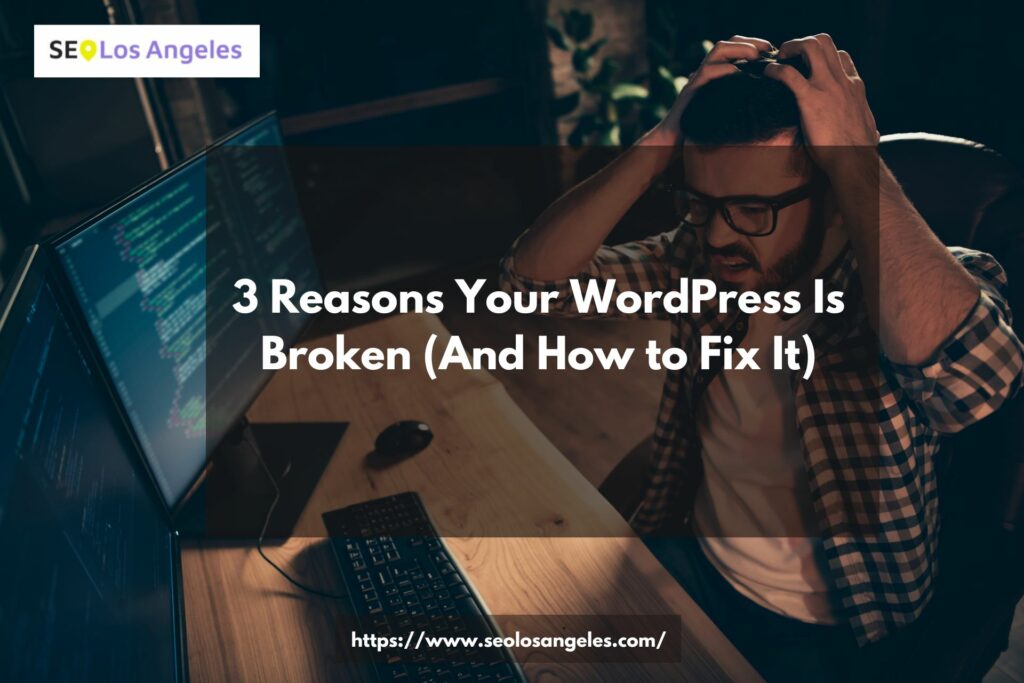Introduction
WordPress is a powerful and popular content management system used by millions of websites worldwide. However, even with its user-friendly interface and extensive features, WordPress can sometimes encounter issues that leave website owners frustrated and seeking solutions. In this article, we will explore three common reasons why your WordPress site may be broken and provide effective strategies to fix them.
1. Outdated Themes and Plugins
One of the primary reasons why your WordPress site might be malfunctioning is the use of outdated themes and plugins. Themes and plugins are crucial components that enhance the functionality and appearance of your website. However, when they are not regularly updated, compatibility issues can arise, leading to broken features or even crashes.
To fix this issue, it is essential to regularly update both your WordPress core and installed themes and plugins. Check for updates in the admin dashboard and ensure that you have backups in place before proceeding with any updates. By keeping everything up to date, you can ensure a smooth and secure experience for both yourself and your visitors.
2. Compatibility Issues with Web Browsers
Another reason why your WordPress site may be experiencing problems is compatibility issues with web browsers. Different browsers interpret and render website elements differently, which can result in broken layouts or functionalities. It’s crucial to test your website across multiple browsers to identify any compatibility issues.
To resolve compatibility problems, you can start by using responsive themes that adapt well to different screen sizes and browsers. Additionally, ensure that your website is built following web standards and uses modern coding techniques. Regularly test your site’s appearance and functionality across popular browsers to catch and address any issues promptly.
3. Security Vulnerabilities
Security vulnerabilities can pose a significant threat to your WordPress site, leading to potential hacks, malware infections, and other malicious activities. If your site has been compromised, it may exhibit various signs of being broken, such as unexpected redirects, defaced pages, or slow performance.
To fix security issues and prevent future breaches, take the following steps:
a. Keep WordPress Updated
Regularly updating your WordPress core, themes, and plugins is crucial for maintaining security. New updates often include security patches that address vulnerabilities identified by the WordPress community. By staying up to date, you can minimize the risk of security breaches.
b. Use Strong Passwords
Weak passwords make it easier for hackers to gain unauthorized access to your site. Ensure that you and your users utilize strong, unique passwords for all accounts associated with your WordPress site. Consider implementing two-factor authentication for an extra layer of security.
c. Install Security Plugins
There are various security plugins available for WordPress that can provide additional protection against common threats. Plugins such as Wordfence, Sucuri, and iThemes Security offer features like firewall protection, malware scanning, and login security enhancements. Research and choose a reputable security plugin that suits your needs.
Conclusion
In conclusion, WordPress is a robust platform, but it can encounter issues that disrupt the functionality of your website. By addressing the three common reasons mentioned above, namely outdated themes and plugins, compatibility issues with web browsers, and security vulnerabilities, you can restore your WordPress site’s performance and ensure a seamless user experience. Regularly update your themes and plugins, test your site on different browsers, and implement security measures to protect your site from potential threats.
FAQs
Q: How often should I update my WordPress themes and plugins?
A: It is recommended to update your WordPress themes and plugins as soon as new updates become available. Regular updates help ensure compatibility, security, and optimal performance.
Q: Can I fix compatibility issues with web browsers on my own?
A: Yes, you can address compatibility issues by using responsive themes, following web standards, and testing your site on different browsers. However, seeking professional assistance may be necessary for complex issues.
Q: Are security plugins enough to protect my WordPress site?
A: While security plugins provide additional protection, they should be used in conjunction with other security measures. Implementing strong passwords, keeping WordPress updated, and adopting secure hosting practices are equally important.
Q: What should I do if my WordPress site gets hacked?
A: If your WordPress site gets hacked, take immediate action. Change all passwords, restore from a clean backup, scan for malware, and strengthen your site’s security measures. Consider consulting a professional if needed.
Q: Are there any other reasons why my WordPress site may be broken?
A: Yes, there could be other reasons for WordPress issues, such as server configuration problems, conflicts between themes and plugins, or coding errors. Troubleshooting such issues may require technical expertise.
